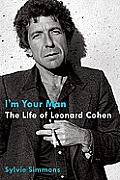I feel cheated, and by my own self. Leonard Cohen was a major part of my life, and I didn’t even know he was there. Talk about clueless.
Born in Montreal, just a few years before I was, he was raised among the well-to-do Jews of that community. As an adolescent, he became a wanderer of the nighttime streets (a habit he never discarded), then (events overlapping) a poet. Not a particularly successful one at first, though he did become part of the beat community—to the extent there was one—in Montreal. He began singing and playing the guitar more or less by accident as recreation more than an art. In fact, he valued the music more for its ability to attract women than for anything else. Start with this combination of poetic talent, a few accidents of circumstance, a lack of ability to settle into any occupation or stay with any single woman (he always had to seek another “muse.”), add drugs and wanderlust, combine them with genius, and you have one of the most remarkable men and remarkable careers in the history of the arts.
I’m Your Man is not only the story of an amazing life, but a beautifully written book more than worthy of its illustrious subject. Sylvie Simmons can write like this:
He… dissolved all boundaries between word and song, and between song and the truth, and the truth and himself, and his heart and its aching.
All the heavy labor, … the highs, the depths to which he had plummeted and all the women and deities, loving and wrathful, he had examined and worshipped, loved and abandoned, but never really lost, had been in the service of this. And here he was, seventy-six years old, still shipshape, still sharp at the edges, a workingman, ladies’ man, wise old monk, showman and trouper once again offering up himself and his songs: “Here I stand, I’m your man.”
And she does so over and over. She plainly loves her subject, but doesn’t blink at the uglies—the relentless womanizing, the various addictions, the continuous impulse to act against his own best interests. She’s conducted prodigious interviews, mined an Everest of material, but keeps the narrative moving through all the detail. She sees to the heart of it all, and we never lose sight of the man. Right in the middle of recounting some piece of backstory, she’ll fold in a paragraph or a page of an interview with Cohen, makes it so integrally part of the narrative that the switch from third to first person flows without making a bubble on the surface of the storytelling stream.
Leonard would later immortalize the horse in the song “Ballad of the Absent Mare.” …
“I was pretty much a bust as a cowboy [laughs] But I did have a rifle. During winter there, there were these icicles that formed on this slate cliff… and I’d stand in the doorway and shoot icicles for a lot of the time so I got quite good.”
And who is this man she’s talking to, and why do I feel cheated? Cohen is a contemporary of Bob Dylan’s, and I know quite a lot about Dylan and can quote a number of his lines and verses. He’s one of my icons. As far as I can tell, Cohen is a better poet, has certainly sustained his quality for longer. A better musician, too. Yet, the first I heard of him was when my Canadian son-in-law gave me a CD as a way of introducing me to some of Canadian culture the Christmas after he married my stepdaughter a few years back. I wish I could say I was immediately taken. The lyrics sounded interesting, but the rumbling, almost chanting voice put me off, dense fool that I was. Am. The book has inspired me to go back and listen again. Then download some more. I didn’t get it. I’m starting to.
And who else is this man?
One who’s written countless songs covered by countless artists of many styles: “Suzanne,” “Hallelujah,” “Bird on a wire,” “Ain’t no cure for love.” I never knew they were his. He’s also a man who lived his convictions, even as they changed. His records never sold in the U.S., popular though he was in Canada and Europe, so maybe I have a tiny excuse for my ignorance. Every time he started to experience some success as a celebrity (or as a “husband”) he walked away from it, found a bare room, and started writing again. He was, for example, nearing sixty, firmly moored in the middle of Hollywood with a gorgeous movie star fiancée, yet walked up the hill to a monastery on Mt. Baldy, where he spent years in meditation, producing almost nothing public, though he kept writing, encouraged by his favorite monk.
Then there was his money—millions by this time—stolen by someone he trusted. Trusted too much. So he had to go back to work, which he did as gladly as he had left it. Somehow he had found some happiness in his dark world. And celebrity came again. Even in America, where he was inducted into the Rock and Roll hall of fame along with Chuck Berry. Two different souls? He didn’t see it that way.
“Roll over Beethoven and tell Tchaikovsky the news”: I’d like to write a line like that.
And that universality is just one of his grand secrets.
On the last page of I’m Your Man, we leave Leonard in L.A., a successful man with two kids, grandkids, pushing 80, and working on his next album. Having no intention of retiring. I hope he waits for that long enough for me to catch up with him. I’m way behind.

